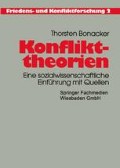Zusammenfassung
Es wurde bereits darauf hingewiesen, daß die Spieltheorie von Mathematikern (9, 10, 125) geschaffen wurde und seit der Veröffentlichung der grundlegenden Abhandlung (126) beinahe ausschließlich von Mathematikern weiterentwickelt worden ist. Diese Theorie kann als ein selbständiger Zweig der reinen Mathematik aufgefaßt werden — als ein System von Theoremen, die aus einer Reihe von Postulaten aufgebaut wurden. Alle rein mathematischen Theorien sind so geartet und als solche praktisch gegen Kritik immun. Die Theoreme sind logische Folgerungen aus den Postulaten. Sie können nur dann “falsch” sein, wenn bei den Ableitungen Irrtümer vorgekommen sind. Wenn daher die Gültigkeit der Theoreme, Lösungen usw. nachgeprüft worden ist, bleibt als Kritik nichts mehr zu sagen übrig, es sei denn über die innere Tiefe oder Eleganz der Theorie.
Access this chapter
Tax calculation will be finalised at checkout
Purchases are for personal use only
Preview
Unable to display preview. Download preview PDF.
Literatur (entsprechender Auszug)
Borel, E. “Applications aux jeux de hasard.” Traité du calcul des probabilités et de ses applications. Paris: Gauthier-Villar, 1938.
Borel, E. “Sur les systèmes de formes linéaires à déterminant symétrique gauche et la théorie générale du jeu.” Comptes Rendus de l’Academie des Sciences, January 10, 1927.
Gause, G. F. Struggle for Existence. Baltimore: The Williams and Wilkins Co., 1934.
Kaplan, M. A. System and Process in International Politics. New York: John Wiley & Sons, 1957.
Luce, R. D., and E. W. Adams. “The Determination of Subjective Characteristic Functions in Games with Misrepresented Pay-off Functions.” Econometrica, 24 (1956), pp. 158–71.
Luce, R. D., and H. Raiffa Games and Decisions. New York: John Wiley & Sons, 1957.
Schelling, T. C. “Bargaining, Communication, and Limited War.” Conflict Resolution, 1 (1957), pp. 19–36.
Von Neumann, J. “Zur Theorie der Gesellschaftsspiele.” Mathematische Annalen, 100 (1928), pp. 295–320.
Von Neumann, J. and O. Morgenstern. Theory of Games and Economic Behavior (2d edition). Princeton: Princeton University Press, 1947.
Whitehead, A. N. Science and the Modern World. New York: The Macmillan Company, 1925.
Rights and permissions
Copyright information
© 1996 Springer Fachmedien Wiesbaden
About this chapter
Cite this chapter
Rapoport, A. (1996). Kritiken der Spieltheorie. In: Konflikttheorien. Friedens- und Konfliktforschung, vol 2. VS Verlag für Sozialwissenschaften, Wiesbaden. https://doi.org/10.1007/978-3-663-10515-2_32
Download citation
DOI: https://doi.org/10.1007/978-3-663-10515-2_32
Publisher Name: VS Verlag für Sozialwissenschaften, Wiesbaden
Print ISBN: 978-3-663-10516-9
Online ISBN: 978-3-663-10515-2
eBook Packages: Springer Book Archive

